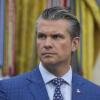
U.S. Defense Secretary Pete Hegseth speaks during a news conference at the Pentagon on June 26.
Andrew Harnik/Getty Images
hide caption
toggle caption
Andrew Harnik/Getty Images
The Pentagon will drastically change its rules for journalists who cover the Department of Defense, two U.S. officials who are not authorized to speak publicly confirmed to NPR Friday. The move drew sharp criticism from news organizations, who said it violated the bedrock of a free press.

Going forward, journalists must sign a pledge not to gather any information, including unclassified reports, that hasn’t been authorized for release.
Using the rebranded “Department of War” acronym, “DoW,” the 17-page document obtained by NPR outlining the new rules for the media says those who fail to obey the new policy will lose their press credentials — cutting off access to the headquarters of the largest department in the U.S. government.
“DoW remains committed to transparency to promote accountability and public trust,” the document said. “However, DoW information must be approved for public release by an appropriate authorizing official before it is released, even if it is unclassified.”

According to the document, journalists who report on news outside of the explicit commands of the Pentagon could be deemed “a security or safety risk” and have their credentials stripped.
Writing about the shift, Defense Secretary Pete Hegseth posted Friday on social media that, “The ‘press’ does not run the Pentagon — the people do.”
Earlier this year, Hegseth announced new rules limiting reporters’ ability to move freely through the Pentagon without an approved escort — a change that broke years of tradition of both Democratic and Republican administrations.
“The press is no longer allowed to roam the halls of a secure facility. Wear a badge and follow the rules — or go home,” Hegseth wrote in the Friday tweet.
These new restrictions fall in line with the broader policy of the Trump administration to attempt to limit coverage from outlets who President Trump has deemed unfair.
Hegseth’s decision was quickly and sharply derided by members of the media and proponents of a free press, who noted that pre-approval of reportable material would limit the ability of reporters to provide vital news to the public about America’s military.
“This is a direct assault on independent journalism at the very place where independent scrutiny matters most: the U.S. military,” National Press Club President Mike Balsamo said in a statement.
“For generations, Pentagon reporters have provided the public with vital information about how wars are fought, how defense dollars are spent, and how decisions are made that put American lives at risk. That work has only been possible because reporters could seek out facts without needing government permission.”
The Pentagon Press Association said it was aware of the new policy and was in the process of reviewing it.
Thomas Evans, NPR’s editor-in-chief, said: “NPR is taking this very seriously. We’ll be working with other news organizations to push back. We’re big fans of the 1st Amendment and transparency and we want the American public to understand what’s being done in their name.”
Disclosure: This story was written and reported by NPR Correspondents Quil Lawrence, Alana Wise and David Folkenflik. It was edited by Senior Editor Avie Schneider, Editor Miguel Macias and Deputy Managing Editor Jim Kane. Under NPR’s protocol for covering itself, no news executive or corporate official reviewed the story before it was posted publicly.
NPR’s David Folkenflik contributed reporting.



